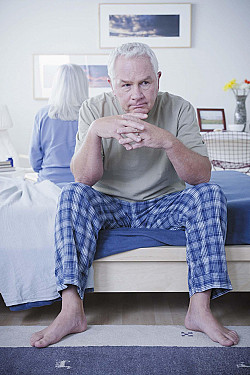Seeking help for orgasm problems
Anorgasmia and delayed orgasm can be stressful for men and their partners. Here's what you can do.
- Reviewed by Howard E. LeWine, MD, Chief Medical Editor, Harvard Health Publishing; Editorial Advisory Board Member, Harvard Health Publishing

Premature ejaculation affects about 30% to 40% of men. However, two issues that many men encounter with age take the opposite form: they can't achieve an orgasm or have difficulty doing so (anorgasmia), or their orgasms take longer than usual (delayed orgasm). Men can experience either one or both.
"It's not known how common these conditions are, as men are often reluctant to discuss them with their doctor or partner," says Dr. Michael O'Leary, a urologist at Harvard-affiliated Brigham and Women's Faulkner Hospital. "While these conditions can be stressful, they don't have to interfere with your sex life, as there are many ways to manage them."
What's in a name
With anorgasmia, you can still get an erection and enjoy stimulation from intercourse, oral sex, and manual stimulation, but can't reach orgasm. In comparison, delayed orgasm is defined as taking longer than 30 minutes to achieve orgasm and ejaculate or you may experience the sensation of orgasm but not ejaculate.
It's unclear what causes these conditions. Some research suggests a combination of factors, such as changes in penis sensitivity, lower testosterone levels, medication side effects, and lack of exercise.
Either condition also can occur when a man enters a new relationship. For instance, a man may feel stressed about pleasing his new partner. And if he has not been sexually active for a while, he may struggle with performance anxiety. "Men also may feel pressured to climax within a specific time frame, which can exacerbate the problem," says Dr. O'Leary.
Treatment and options
Neither anorgasmia nor delayed orgasm is a red flag for a severe health issue, according to Dr. O'Leary. In many cases, they may not even be a problem in the bedroom. "Men should look at how the conditions affect their overall sex life," he says. "Even if you don't always have an orgasm, you and your partner can still experience pleasure from the intimacy that accompanies any sexual encounter."
Still, if anorgasmia or delayed orgasm is a source of stress in your sex life, specific strategies may help. For example:
Sex therapy. Therapy with a sexual health expert can address some of the issues that cause orgasm trouble, especially those related to a new relationship or some other psychological matter. "Many times, it's not a physical problem, but the connection between the brain and body," says Dr. O'Leary.
Testosterone. Since both anorgasmia and delayed orgasm can be related to low testosterone levels, a simple blood test can determine if you might benefit from supplementation. "The science is still exploring the effectiveness of increasing low levels of testosterone, but it's something that you and your doctor can consider," says Dr. O'Leary.
Medication. No drugs are FDA-approved specifically to treat anorgasmia or delayed orgasm, but one drug, called cabergoline, may help. Orgasm is associated with a surge in prolactin, a hormone made in the brain's pituitary gland. If blood prolactin levels are always high (confirmed by a blood test), there is no surge. Cabergoline lowers prolactin levels, which allows for the surge commonly experienced with orgasm. The drug tends to be well tolerated, and it's presumed safe, although its long-term effects are unknown. Consult with your doctor about whether this is an option.
Some antidepressants, especially selective serotonin reuptake inhibitors like fluoxetine (Prozac) and sertraline (Zoloft), may cause anorgasmia or delayed orgasm as a side effect. If you take an antidepressant, talk with your doctor about lowering your dosage or switching to a different one.
Trying new positions and techniques. Modifying sexual positions or foreplay practices with your partner may increase your arousal and help you achieve orgasms.
Penile vibratory stimulation. This clamp-like device is placed around the penis and vibrates to stimulate the nerves in the base of the penis to encourage an orgasm. It's used before sex and can be incorporated into foreplay.
Alcohol. "Alcoholic beverages and sex often go together, but always drink in moderation," says Dr. O'Leary. "As Shakespeare wrote, alcohol 'provokes the desire, but it takes away the performance.'"
Image: © Wavebreakmedia Ltd/Getty Images
About the Author

Matthew Solan, Former Executive Editor, Harvard Men's Health Watch
About the Reviewer

Howard E. LeWine, MD, Chief Medical Editor, Harvard Health Publishing; Editorial Advisory Board Member, Harvard Health Publishing
Disclaimer:
As a service to our readers, Harvard Health Publishing provides access to our library of archived content. Please note the date of last review or update on all articles.
No content on this site, regardless of date, should ever be used as a substitute for direct medical advice from your doctor or other qualified clinician.
















